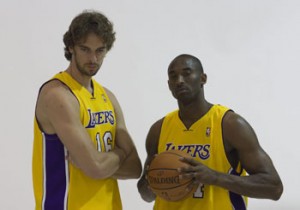
Spain’s Mundo Deportivo recently posted an online poll asking which NBA player Spaniards want to see play in the ACB League. Kobe Bryant won with 28 percent, followed by his teammate and Spaniard Pau Gasol, with 17 percent. Spain exports many of its finest players such as Ricky Rubio, who has gone to the Minnesota Timberwolves, and in any other year, Bryant’s arrival and Gasol’s homecoming would be a fantasy for Spanish basketball fans. But this year there is a glimmer of hope.
On July 1, NBA owners locked out their players over lengthy contract disputes, which have lasted years. All contracts are suspended and any form of communication is prohibited, including social media, between coaching staffs/front offices and players. The New York Times reported NBA Commissioner David Stern saying, “If there’s a lockout, the players are free.” But free to do what? Anything, really, until the Players Association and owners come to an agreement. Some European teams are jumping at the opportunity to temporarily capture NBA talent.
Real Madrid offered newly acquired Dallas Maverick Rudy Fernández a six-year $26-million contract. The sharpshooting Spaniard declined what would have made him the highest-paid basketball player in Spanish history. By turning down Real Madrid, Fernández took about a $3-million pay cut over the next two years and now risks a year-long, non-paid holiday if the lockout persists. Economically, his decision seems nonsensical. Emotionally, his choice to pass up playing in his home country is puzzling. But Fernández has two points of justification.
One, if he were to accept the Madrid deal, an injury could ruin his career in the United States. NBA players become uninsured once they sign a contract in a separate league, meaning a broken ankle in Spain’s ACB League would cause a fractured contract in Dallas — slashing almost all hope of returning to the United States six years later after the proposed contract’s expiration. Two, after a disappointing start with the Portland Trailblazers and portrayed as a problem child by the American media, Fernández has an opportunity to revitalize his career and image as a part of the defending champions Dallas Mavericks, which could ultimately lead to a more lucrative deal after his current one expires in 2013.
No Rudy, no thank you.
During the 1998 lockout, players who chose to play in Europe, like Arvydas Sabonis and Michael Olowokandi, returned to the United States once the suspensions on their NBA contracts were lifted. With this as a likely scenario in the 2011 version, monthly contracts, not hefty long-term deals like Real Madrid’s for Fernández, make more sense.
Deron Williams, one of the NBA’s elite point guards, agreed on terms to play for the Turkish club Besiktas next season under a contract that will pay him about $300,000 per month. In the event of an injury, Williams, who is currently the highest-level player to make the verbal jump, would jeopardize a guaranteed $34 million over the span of two years in his contract agreement with the New Jersey Nets. Besiktas’s management, who brought in ex-NBA superstar Allen Iverson last year, are salivating at the possibility of signing NBA top-tier talent. The club’s coach even brought up the possibility of making a run at Kobe Bryant, Spain’s most beloved NBA player.
Unlike in Turkey, teams in the ACB League have a history of bringing back their home-grown talent for the long haul (such as Juan Carlos Navarro and Jorge Garbajosa), rather than signing Americans to short-stinted guest appearances — explaining Real Madrid’s attempt to woo Fernández. And with the exception of a few players per team, all clubs’ rosters in the ACB League are set. Gambling on an NBA player’s production month-by-month seems risky and potentially disruptive to a team’s chemistry and strategy. Given Spain’s economic hardships and massive unemployment, signing a foreigner to play part-time instead of a committed Spaniard could be deemed unpatriotic — especially if Spanish clubs offer American-born players monthly salaries pegged to the astronomical figures they are accustomed to.
Basketball players, like in any other profession, work in order to make money. Many low-to-mid-level NBA players without endorsements, who suffer from high consumption and feeble savings habits, can’t afford a year without income. If late October comes and negotiations between the Players Association and owners remain stalled, there will be a supply. But will there be a demand? In Spain, probably not — unless your last name is Gasol or Rubio, and if the ACB League wants to please its fans, Bryant.
Leave a Reply
You must be logged in to post a comment.